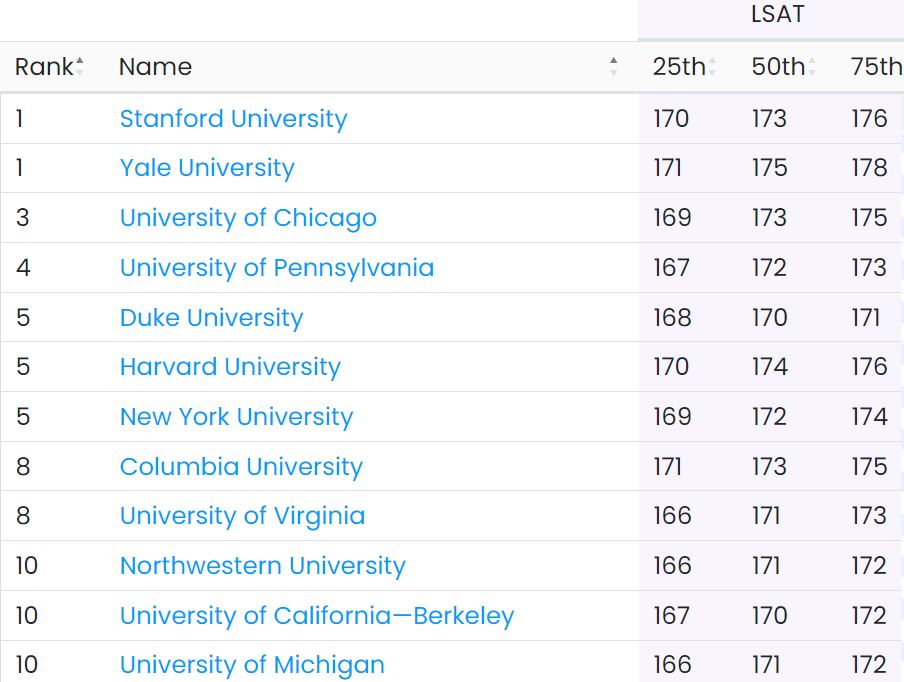So, you’re preparing for the Law School Admission Test but have questions?
“How much do you need to score to get in?”
“What’s a good LSAT score?”
Well, we have the answers.
In this article, we’ll explore what makes a good LSAT score and the factors that matter most in law school admissions. From average score to highest LSAT score, we’ve got you covered.
So, let’s get in.
Quick Summary
- Understanding LSAT Scoring: LSAT scoring involves raw scores, scaled scores (ranging from 120 to 180), and percentiles.
- Defining A Good LSAT Score: A good LSAT score depends on your goals. It’s 170 or higher if you’re targeting top-tier schools; however, 160 puts you in a good position.
- Acceptance Rates Matter: There’s no “pass rate” for the LSAT; instead, focus on acceptance rates at different law schools.
- Competitive And Minimum Scores: A competitive LSAT score is typically 167 or above, while the lowest LSAT score accepted by law schools can be around 144-145.
How Is The LSAT Scored?
Your LSAT score is more than just a number; it’s a key factor in your journey to law school.
To understand this score, let’s break down how it’s calculated and what it means for your future in the legal field.
Raw Score
The first piece of the puzzle is your raw score. This score reflects the number of questions you answered correctly on the LSAT. For instance, a raw score of 60 means you got 60 questions right out of the total attempted questions.
This is pretty much straight.
Then comes the scaled score.
Scaled LSAT Score
Your LSAT scaled score is what truly matters for law school admissions. Yes, it’s that famous LSAT score you see people boasting about.
This score is derived from your raw score and falls within a range of 120 to 180.
How is the raw score converted to a scaled score?
Well, you can’t really know the exact process because the testing authority uses formulae and conversion charts that are not publicly available.
Different prep websites offer conversion charts to estimate your practice test scores. However, remember that it’s not a straightforward conversion. You can have the exact same raw scores for two different LSATs, but your scaled score might vary depending on the LSAT test difficulty.
Now comes the third score type you should know about.
LSAT Score Percentiles
The percentile ranking provides a way to gauge how your LSAT score stacks up against other test takers’ scores. How?
Simply put, your LSAT percentile tells you the percentage of test-takers who scored lower than you did.
For instance, if your LSAT score percentile is 85th, it means you outperformed 85% of all test-takers. If you achieved the 99th percentile, you surpassed a staggering 99% of your peers.
This is how the percentile rank acts as a vital tool for understanding the competitiveness of your score.
LSAT Score Range
The LSAT features 99 to 102 questions, meaning this is the maximum raw score you can get.
The scaled score, on the other hand, has different limits. You can score a maximum of 180 on the LSAT score chart no matter how many questions you answer correctly. Similarly, 120 is the lowest possible score you can get.
However, the median LSAT score or average LSAT score hovers around 152.
What’s A Good LSAT Score?
When it comes to LSAT scores, what’s considered “good” can vary depending on your goals and aspirations. Let’s break it down into three categories: 150 or lower, 160, and 170.
150 or Lower LSAT Score
If you score around 150 on the LSAT, you’re in the middle of the pack, performing better than about 50% of test-takers. This score is close to the median LSAT score, which hovers around 150-152.
But is this score good enough?
Well, if your primary aim is to gain admission to any law school, a score in the 147-150 range can suffice (provided you apply wisely).
However, if you wish to build a solid law career, aiming for a 150 may not be sufficient, as you might end up attending a lower-tier program with limited access to top-tier firms.
160 LSAT Score
Achieving a score of 160 on the LSAT places you ahead of approximately 80% of test-takers.
Many consider this a “good” LSAT score and can open doors to some of the top 50 law schools. However, if your ambitions include scholarships or admission to a top 20 law school, you should set your sights on the 165-170 score range.
170 LSAT Score
Scoring 170 or higher places you among the top 2-3% of LSAT test-takers, making you an exceptionally competitive candidate at leading law schools like Yale, Harvard, Stanford, and Columbia.
Plus, a 170 or higher LSAT score significantly enhances your chances of gaining admission to a prestigious law school, even if you don’t have an impressive resume or personal statement.
So, this clarifies that the definition of a “good” LSAT score depends on your goals and the law school you’re targeting.
However, generally speaking, 160 or higher scores are considered “good” and put you in a favorable position to get into highly rated law schools.
What Is The Pass Rate For The LSAT?
LSAT isn’t a pass-fail test.
As already explained, your LSAT score can go as high as 180 and as low as 120. However, 150 to 152 is considered the average or median LSAT score.
So, as an LSAT aspirant, you shouldn’t be worried about passing or failing the LSAT. Instead, you should be looking at the acceptance rate at different law schools and set reasonable goals for yourself.
Now that we have an idea of a good LSAT score and the pass rate, let’s see how much do you need to compete for a place in the top 20 or 30 law schools.
What Is A Competitive LSAT Score?
Let’s be honest. Every career-oriented person wants the best exposure and experience. In the realm of law, that comes with studying at top law schools, and for that, you need a competitive score.
How much is that?
Well, as per LSD’s 2024 law school rankings, you need a 166 or higher LSAT score to get into the top 10 law schools.

So, to be able to compete at the highest level, you should aim for 167+. Anything below that won’t be considered a competitive LSAT score.
What Is The Lowest LSAT Score Accepted By Law Schools?
Before we answer this question, remember that law schools require more than just an LSAT score to grant admissions.
To apply to a law school, you need:
- A decent resume
- A solid personal statement
- Some recommendation letters
- A minimum GPA
This means if your LSAT score is not that impressive, you can cover that up with other things. Conversely, if you don’t have a great track record or resume, you can still get into a top law school with a high LSAT score.
Still, law schools do have a minimum barrier to entry. 144 – 145 is considered to be the lowest LSAT score accepted by law schools.
FAQs About Good LSAT Scores
How often do people get 180 on the LSAT?
According to many sources, including prep websites and data published by the Law School Admission Council (LSAC), from 2006-2009, of all LSATs administered, about 0.1% of the total applicants got 180 on the LSAT. (1)
How long are LSAT scores valid?
LSAT scores are valid for five years after the date of your test.
How hard is it to get a 170 on the LSAT?
A 170 LSAT score puts you in the 2-3% of test takers, meaning you have to prepare better and perform better than almost 97% of law school applicants.
While it might sound hard, 2 to 4 months of LSAT dedicated prep can help you achieve this score.
What LSAT score do I need for Harvard Law?
An LSAT score of 170+ can get you into Harvard Law, assuming that the remaining elements of your application are equally good.
What Is The Highest Score On The LSAT?
180 is the highest score on the LSAT.



